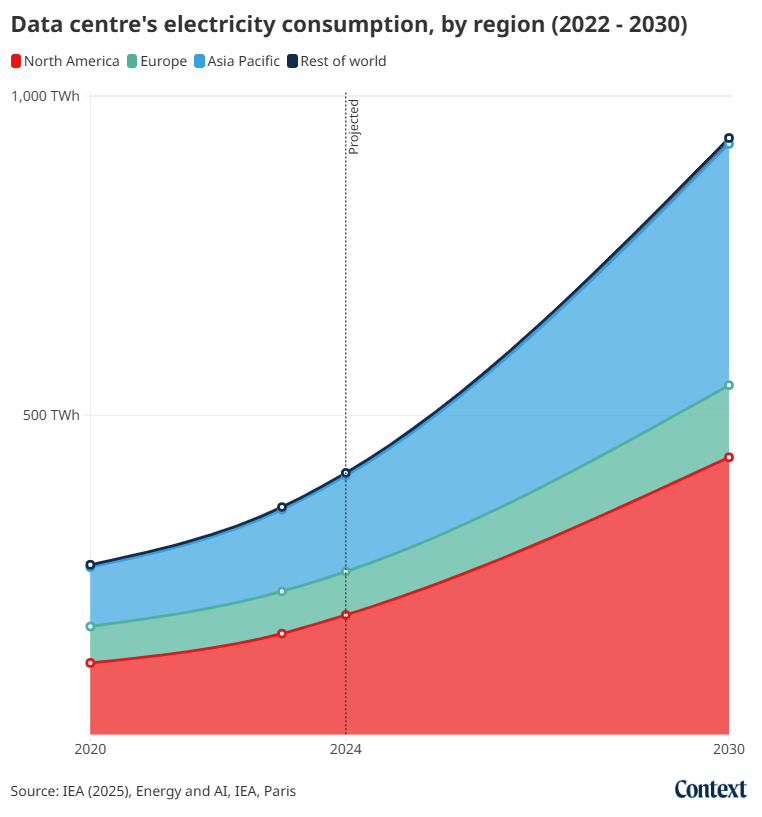|  | Know better. Do better. | |  | DataveillanceAI, privacy and surveillance in a watched world |
|
| | Welcome back to Dataveillance. Elon Musk is a recurring character in the news, but have you heard of the community in Tennessee fighting against xAI, his artificial intelligence company?
Last June, the firm started operating a data centre in Memphis to power the Grok chatbot to the surprise of the community and its local leaders, who said they were not consulted on its arrival.
Since then, environmentalists and other activists have joined up to demand answers on the environmental cost of Musk’s supercomputer.
I recently spoke to Amanda Garcia, senior attorney at the Southern Environmental Law Center, one of the groups concerned about the opacity with which xAI has set up show in the neighbourhood of South Memphis.
“There continues to be a real lack of transparency about the total amount of power and water the company is going to need and how that is going to affect the community, both in the short and long term,” Garcia told me over a Zoom call.
Using thermal imaging, the coalition discovered xAI is operating 35 gas turbines, which it claims violates the Clean Air Act and surpasses the number for which the company has submitted permits.  Construction continues on Elon Musk's xAI supercomputer Project Colossus in Memphis, Tennessee, U.S. April 11, 2025. REUTERS/Karen Pulfer Focht |
Meanwhile, xAI applied for a permit with Shelby County’s health department to permanently operate 15 gas turbines, which will provide 300 megawatts of power.
The local community has joined town halls and other public discussions over the permit.
Garcia told me that the coalition is asking the health department to shut down all of xAI’s turbines until they get the appropriate permit. Likewise, it is demanding xAI fully explain its expansion projects.
“There's a real concern in the community that there is going to be a persistent use of unpermitted and largely uncontrolled combustion turbines in South Memphis,” said Garcia.
We’ll know more about the county health department decision on the permit in the next few weeks.
How does AI harm the environment?
Training the generative AI’s models that we commonly use – from ChatGPT to Grok – requires computational power that runs on massive amounts of electricity.
As my colleague Adam Smith has been reporting, Big Tech companies more than doubled their combined energy use between 2017 and 2021 to about 72 terawatt-hours, according to the International Energy Agency. .png/640w) Data centre's electricity consumption, by region (2022-2030). Thomson Reuters Foundation/Diana Baptista |
Water is also necessary for cooling the hardware that is working full-time on these data centres. The coalition in Memphis worries that xAI “has the potential to have a long-lasting impact on our water infrastructure, supply and quality.”
The people of Shelby County also worry about the xAI’s turbines worsening their air quality problem. Last year, the county received an “F” grade from the American Lung Association for its ozone pollution.
xAI has not replied to a request for comment. The Greater Memphis Chamber of Commerce, which has served as an intermediary between the community and xAI, said in a press release that the company will be removing an undisclosed number of gas turbines in the next two months.
These turbines will be shut down after the construction of an electric substation receiving 150MW of grid power from the Memphis public utility, the group said.
However, according to documents obtained by the Southern Environmental Law Center, xAI plans to install between 40 and 90 gas turbines in a second location. |  | “I'm concerned that there were failures to follow existing law and processes that are set up to protect the public, whether it's from air pollution impacts or rate-payer impacts at the utility level." | | |
| |
|
An industry of secrets
What is happening in Memphis is a trend seen in other parts of the world. Tech firms are cagey about their water usage and energy consumption, and governments help keep this information a secret.
My colleague Fintan McDonnell and I faced this problem last year, when trying to document the water usage of data centres located in Querétaro, a drought-stricken state in Mexico.
Soon, we found that companies like Microsoft, Google and Amazon refuse to provide data on their water usage and the tech used in their data centres which, they claim, are becoming increasingly water efficient.
From Memphis to Querétaro, communities are fighting for accountability from their local governments and for a place at the table when the negotiations with tech companies take place.
“I'm concerned that there were failures to follow existing law and processes that are set up to protect the public, whether it's from air pollution impacts or rate-payer impacts at the utility level,” said Garcia.
At Context, we are actively investigating the environmental cost of data centres in regions affected by climate change and drought.
We also train journalists in Latin America about the impact of AI on human rights, hoping that reporting on tech accountability spreads throughout the region. |
|
|
| | Technological innovations like robots and biometric recognition are in expanding use in Trump's deportation campaign | European countries host the most child sexual abuse content online, but proposed rules to protect victims and identify perpetrators have stalled | Internet access, key to cyber-scam centres, is proving difficult to police as tools like Musk's Starlink become more accessible | |
| | | | | | |
|